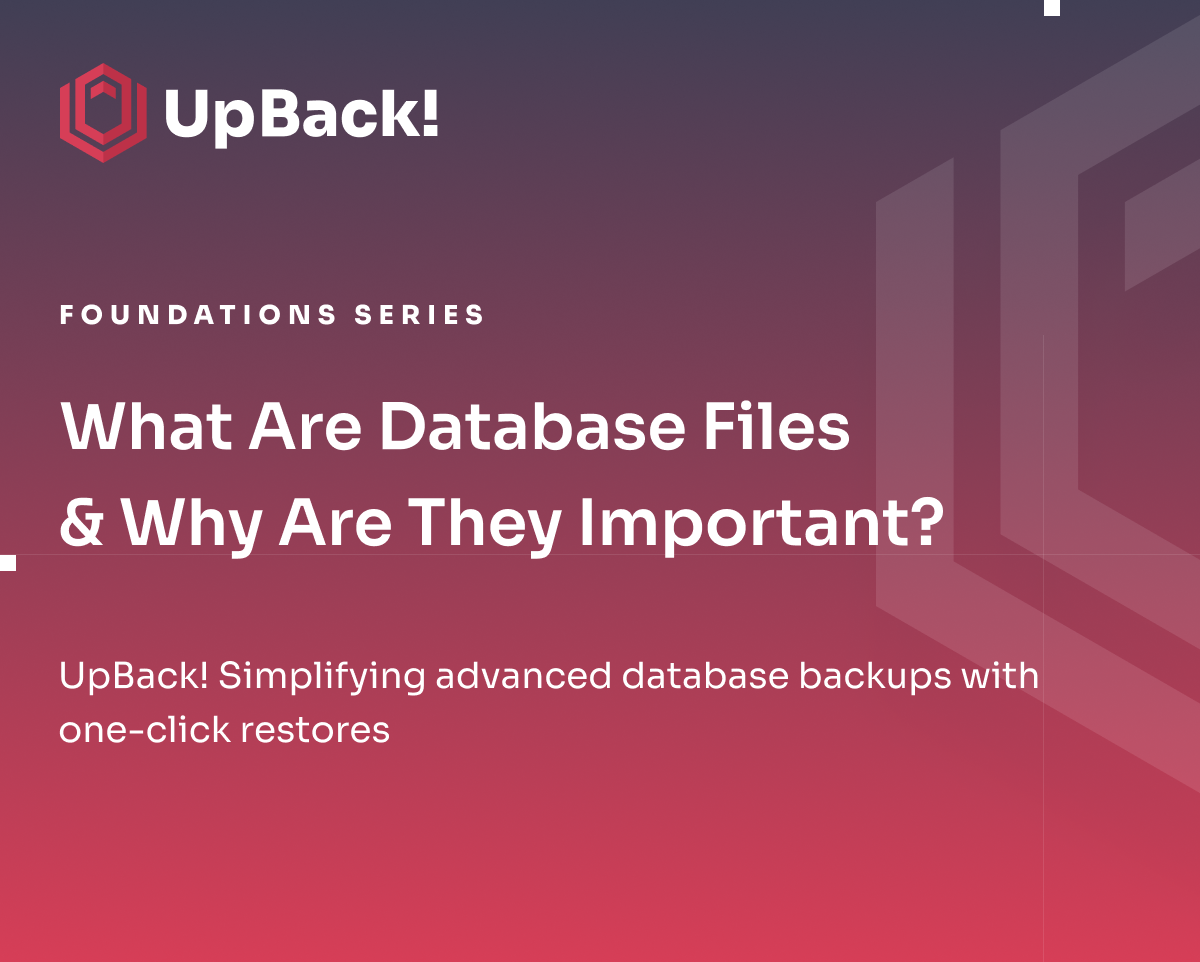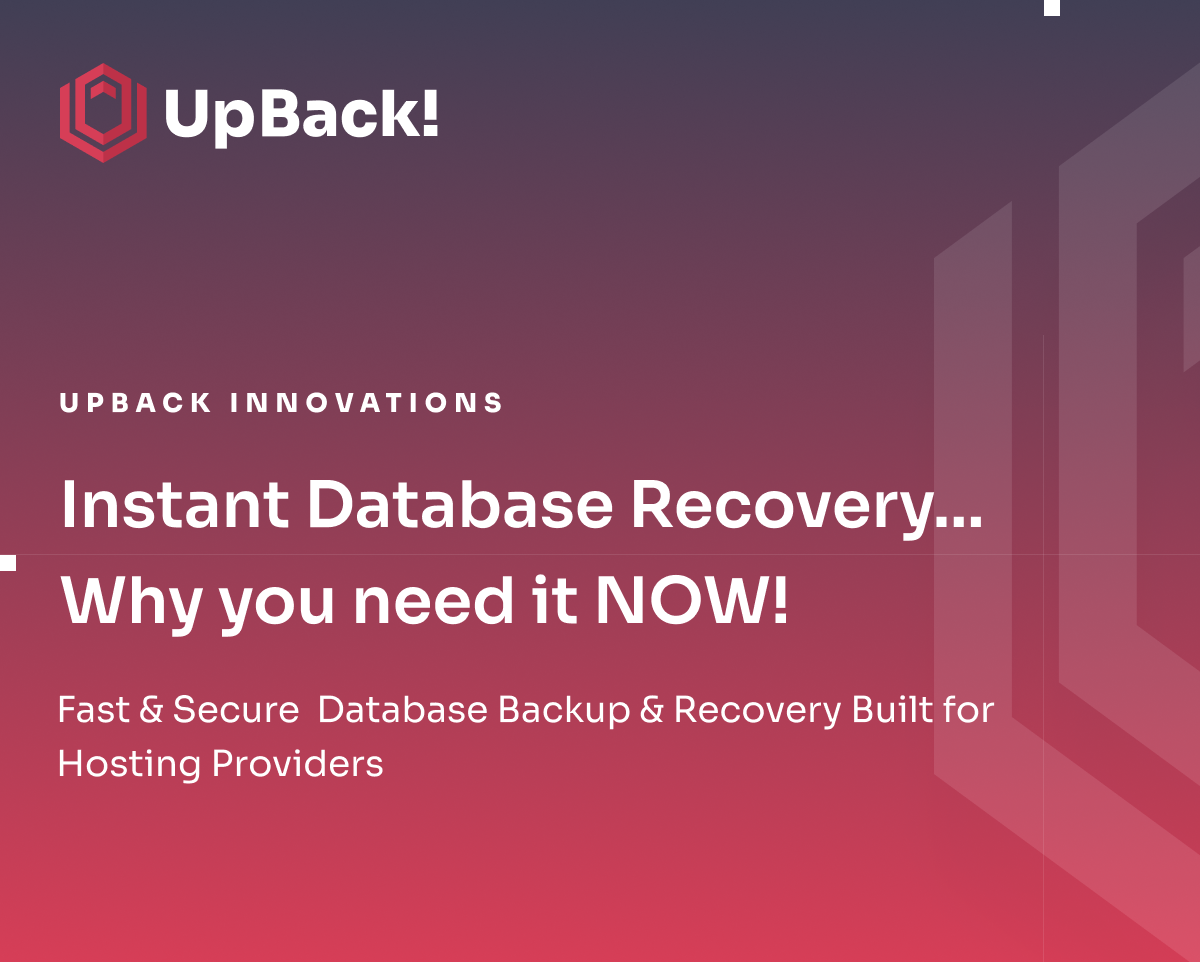Are Your Database Files Truly Protected Against Unexpected Failures?
Database file management is the cornerstone of reliable and efficient data operations. For systems like MySQL, MariaDB, and PostgreSQL, database files are vital, ensuring that structured data is stored, retrieved, and updated seamlessly. However, managing these files effectively is a challenging task.
Database files face constant risks, from hardware failures and human errors to unforeseen disasters. Without a dependable backup and recovery solution, businesses may encounter data loss, costly downtime, or operational disruptions.
That’s where UpBack is! excels. Purpose-built for database file management, UpBack! provides agent-based backup and recovery solutions tailored for MySQL, MariaDB, and PostgreSQL. By leveraging advanced features like automated backups, data integrity checks, and S3-compatible storage integration, UpBack! simplifies the complexities of managing database files, ensuring reliability and peace of mind.
What Are Database Files and Why Are They Important?
Database files are the foundation of database systems like MySQL, MariaDB, and PostgreSQL. These files are the storage units where structured data is housed, ensuring that information is consistently available for retrieval, updates, and transactions.
Far from being simple containers, database files are meticulously structured to support efficient data operations, including indexing, queries, and recovery. Each database system uses specific file types to organise and manage data:
MySQL/MariaDB:
- .ibd files: Store table data and indexes within the InnoDB storage engine.
- .frm files: Contain metadata that defines the structure of database tables.
PostgreSQL:
- .data files: House table data and indexes for efficient access.
- Write-Ahead Logs (WAL): Preserve transaction logs, ensuring data consistency and enabling recovery to a specific point in time.
These files play a critical role in maintaining business continuity. They ensure smooth daily operations and serve as the foundation for disaster recovery. Database files are vulnerable to corruption, data loss, and downtime without reliable management and protection.
Understanding the importance of database files and their unique characteristics is essential for implementing effective backup and recovery strategies. UpBack! Simplifies this process, offering a comprehensive solution for confidently managing MySQL, MariaDB, and PostgreSQL database files.
Challenges of Managing Database Files for Recovery
Database file management is essential but fraught with challenges that can jeopardise data integrity and availability. These issues can escalate without the right tools and strategies, leading to significant disruptions. Here are some of the most common challenges:
1. Ensuring Data Integrity
Database files are dynamic and constantly updated with new transactions and changes. This makes maintaining data integrity during backups a complex task. Corruption in critical files, such as transaction logs, can disrupt recovery efforts and lead to permanent data loss.
2. Minimising Downtime
Businesses often rely on systems that must remain operational around the clock. Taking databases offline for backups can cause unacceptable interruptions. However, live backups come with their risks, requiring precise coordination to ensure consistency.
3. Managing Complexity
Databases like MySQL, MariaDB, and PostgreSQL have unique file structures and requirements. Designing a reliable backup strategy that accommodates these variations while avoiding partial or incomplete backups can be daunting, especially for dynamic environments.
4. Scalability
As databases grow, backups can become resource-intensive, consuming significant storage and processing power. Without a scalable solution, businesses may struggle to maintain efficient and timely backups.
UpBack! addresses these challenges head-on, providing a modern, efficient approach to database file management. In the next section, we’ll explore how UpBack! overcomes these obstacles with innovative features and seamless integration.
How UpBack! Addresses These Challenges
1. Agent-Based Architecture
UpBack! uses an agent-based approach, directly integrating with databases to capture consistent and accurate backups. This eliminates the risks associated with raw file manipulation or incomplete snapshots, ensuring data integrity even during live operations.
2. Seamless Scalability
With support for S3-compatible storage and integration with cloud suppliers, UpBack! offers a highly scalable solution. Whether you’re managing small datasets or growing enterprise systems, UpBack! adapts to meet your storage and recovery needs.
3. Automated Integrity Checks
One of UpBack! 's standout features is its automated data integrity verification. Each backup is thoroughly checked to ensure it is complete and free from corruption so you can recover confidently when needed.
4. Minimise Downtime with Live Backups
UpBack! supports live backups, allowing you to protect your data without taking systems offline. This feature is critical for businesses that require continuous availability while ensuring their backups remain consistent and reliable.
5. Streamlined Recovery
UpBack! provides advanced recovery options, including point-in-time recovery, enabling users to restore databases precisely. This capability is invaluable for mitigating the impact of accidental deletions or system errors.
Best Practices for Database Backup and Recovery
Implementing effective database backup and recovery practices is essential to ensuring data integrity and minimising downtime. Businesses can protect their critical data and streamline recovery processes by adopting proven strategies and leveraging tools like UpBack!
1. Automate Your Backups
Manual backups are prone to human error and inconsistencies. Automating the process ensures that all critical data is consistently captured without additional effort. UpBack! simplifies automation with a fully integrated scheduler, ensuring your backups occur reliably and on time.
2. Use Incremental Backups
Performing full backups can be time-consuming and resource-intensive. Incremental backups only capture changes made since the last backup, save storage space and reduce system strain. UpBack! employs this method to optimise backup efficiency while maintaining reliability.
3. Enable Point-in-Time Recovery
Recovering a database to a specific point is invaluable for mitigating accidental deletions or system errors. By leveraging transaction logs, UpBack! allows precise point-in-time recovery, minimising data loss and operational impact.
4. Prioritise Data Integrity
Backups are only as good as their reliability. Regular integrity checks are crucial to ensure your data is complete and corruption-free. UpBack! automates these checks, giving you confidence in the recoverability of your backups.
5. Store Backups Offsite
Protecting your backups from localised threats, such as hardware failures or natural disasters, is critical. UpBack! integrates seamlessly with S3-compatible cloud storage, ensuring secure, offsite backups that remain accessible when needed.
Why Choose UpBack! for Database Management?
Comprehensive Protection for Database Files
UpBack! provides robust protection for your database files with its agent-based architecture, which ensures consistent and reliable backups during live operations. Unlike traditional file-based or snapshot methods, UpBack! integrates directly with MySQL, MariaDB, and PostgreSQL databases to deliver unparalleled data integrity.
Scalable Solutions for Growing Businesses
As your database grows, so does the need for efficient storage and recovery. UpBack! seamlessly integrates with S3-compatible storage and a variety of cloud providers, giving you the flexibility to scale your backup strategy as your business evolves.
Simplified Automation and Management
Managing database backups doesn’t need to be a manual, time-consuming task. UpBack! streamlines the process with automated backup scheduling and built-in data integrity checks, ensuring your database files are always protected without added effort.
Fast and Precise Data Recovery
Accidental deletions and system failures can strike at any time. With UpBack!’s advanced point-in-time recovery capabilities, you can quickly restore your database to a specific moment, minimising data loss and keeping your business running smoothly.
Built for MySQL, MariaDB, and PostgreSQL
UpBack! is purpose-built to meet MySQL, MariaDB, and PostgreSQL systems' unique needs. Its features are tailored to protect these database structures, ensuring your backups are always reliable and recovery-ready.
Secure Your Database, Simplify Your Workflow
Database management should empower your business and keep it simple. With UpBack!, you gain a solution that’s as dependable and easy to use. Whether you’re securing your database files against potential risks or scaling your backup strategy for the future, UpBack! has you covered.
👉 Start your free trial today and discover how UpBack! can transform your approach to database file management.
For more details on getting started, check out our Installation Guide and take the first step towards effortless database backup and recovery.




